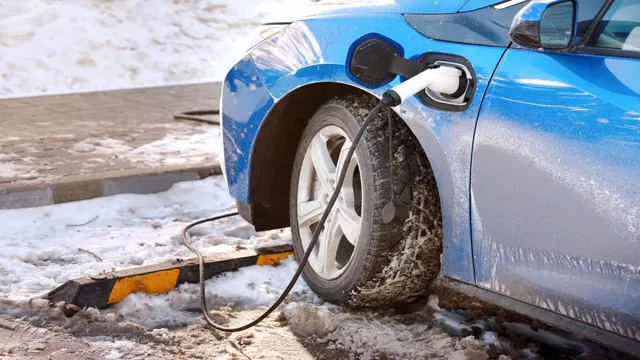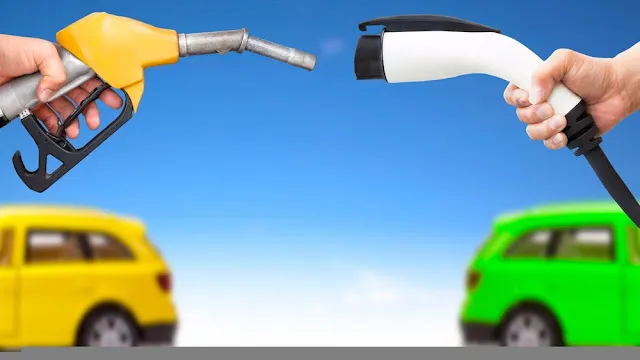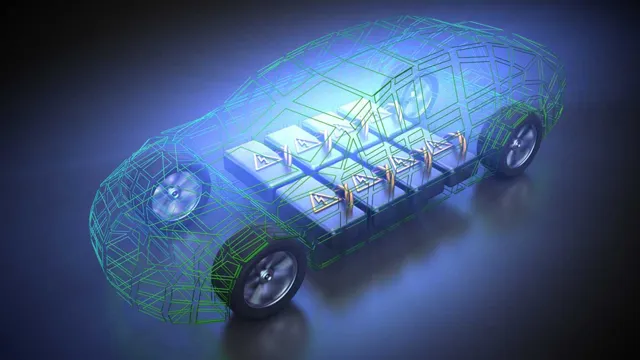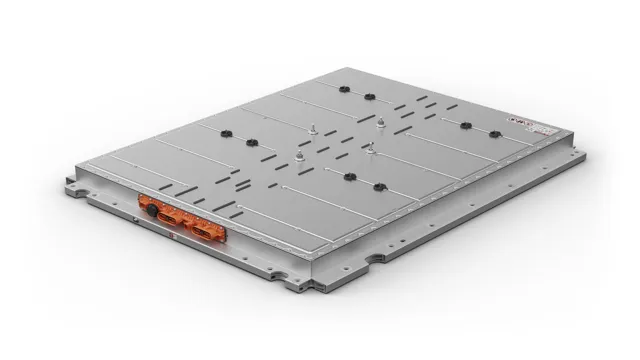Chilly Challenges: How Electric Car Batteries Fare in Cold Weather
Winter is here, and with it comes the inevitable drop in temperatures. For those driving electric cars, the cold weather can be a cause for concern when it comes to the battery’s performance. As temperatures drop, the battery’s ability to hold a charge decreases, which in turn affects the car’s range.
But fear not, we’ve got you covered! In this guide, we’ll explore how cold weather affects electric car batteries and what you can do to ensure your battery stays healthy and your car stays on the road. So, grab a warm drink and let’s dive in!
The Impact of Cold Weather on Battery Life
Electric car batteries can be greatly affected by cold weather, leading to reduced performance and potential damage. This is because batteries rely on chemical reactions to generate electricity, and cold temperatures slow down these reactions, reducing the battery’s ability to hold a charge and deliver power. Furthermore, cold weather can cause the battery’s electrolyte fluids to freeze, creating irreparable damage to the internal structure of the battery itself.
If you live in an area with cold winters, it is essential to keep your electric car battery charged and warm, either by using a garage or a battery warmer, or by periodically plugging in your car to maintain its battery’s charge. Ultimately, taking steps to protect your car’s battery during cold weather can help ensure that your electric car continues to perform reliably and efficiently, allowing you to enjoy driving it year-round.
How temperature affects battery performance
When the temperature drops, it can have a negative impact on battery life. As the mercury falls, batteries can lose a significant amount of their power and can struggle to keep up with our daily demands. This is because low temperatures slow down chemical reactions in the battery, ultimately reducing its voltage and capacity.
In addition, batteries that are exposed to cold weather for a prolonged period can also suffer from physical damage, leading to a shorter lifespan overall. It’s important to keep our devices warm and avoid leaving them in the car or outside in the cold for long periods. By taking care of our batteries, we can ensure they stay healthy and continue to perform at their best, regardless of the weather outside.
Why electric cars can struggle in cold weather
Electric cars have grown in popularity in recent years as people become more environmentally conscious. However, cold weather can cause issues for these vehicles due to their reliance on battery power. When temperatures drop, electric car batteries lose efficiency, resulting in shorter driving ranges and longer charging times.
This is because the chemical reactions that occur within the battery are slower in colder temperatures, reducing their ability to generate the necessary energy required to power the car. Additionally, the car’s heating system also places more demand on the battery, further reducing its overall lifespan. It’s important to note that while cold weather can be a challenge for electric cars, advancements in battery technology are continuously being made to address this issue and improve performance in all weather conditions.
Data on battery performance in sub-zero temperatures
Battery life can significantly be affected by cold weather. According to recent data, the performance of lithium-ion batteries, which are commonly used in smartphones and electric vehicles, can drop by as much as 50% in sub-zero temperatures. The lower the temperature, the slower the chemical reaction within the battery, which generates the electric current.
As a result, batteries cannot produce as much power, and their overall capacity is reduced. Moreover, freezing temperatures can damage the battery’s internal components, leading to a permanent loss of performance and a shorter lifespan. It is essential to note that different types of batteries have different temperature thresholds, but generally, the ideal temperature range for most batteries is between 20 to 25°C.
In conclusion, when using battery-powered devices in cold weather, it’s crucial to keep them warm and avoid exposing them to extremely low temperatures for prolonged periods.
Ways to Maximize Battery Life in Cold Weather
Electric car batteries in cold weather can be a cause of concern for many drivers. Luckily, there are ways to maximize your battery life in these chilly conditions. First and foremost, try to keep your battery warm by parking your car in a garage or a heated space.
However, if this is not possible, invest in a thermal blanket for your battery, which will keep it warm and ready to go. Additionally, avoid using features such as heated seats or defrost as they consume significant power and drain your battery faster. Furthermore, precondition your car before departure by using the car’s app or scheduling the start time in advance, allowing the car to warm up and prepare itself for optimal use.
Additionally, keeping your car charged efficiently at all times is critical. A battery with a fuller charge can help in providing better outputs in cold weather. Therefore, charge your car battery frequently in small amounts so that it is always ready for use.
Finally, check the tire pressure regularly, as under-inflation can cause increased friction between the wheels and roads, resulting in more power consumption. In conclusion, these tips will ensure maximum battery life in cold weather conditions, enabling you to enjoy a stress-free and sustainable driving experience.
Tips for driving an electric car in the winter
One of the challenges of driving an electric car in the winter is the effect that cold weather can have on the battery. To maximize your battery life during colder seasons, it’s important to keep the battery warm as much as possible. This can be achieved by preheating the interior of the car while it is still plugged in and using a battery preheater.
Driving more efficiently by minimizing sudden starts and stops can also help to conserve battery power. Another tip is to limit your use of the heater and seat warmers, as these can drain the battery quickly. Finally, it’s essential to keep your tires properly inflated as this can also help to improve your car’s range.
By following these tips, you can enjoy the benefits of owning an electric car all year round, even during the winter months.
Advice for warming up your electric car battery
Electric Car Battery, Maximize Battery Life, Cold Weather As the temperature drops, electric car owners need to take extra precautions to maximize their battery life. One of the best ways to do this is by warming up the battery before starting a trip. This can be done by preheating the car while it’s still plugged in and charging, or by using a battery warmer.
Another tip is to limit the use of power-hungry accessories, such as heated seats or the air conditioner, to conserve battery power. It’s also important to avoid rapid acceleration and hard braking, both of which can put extra strain on the battery. By following these simple steps, electric car owners can ensure that their battery stays warm and healthy in even the coldest weather.
The benefits of pre-heating your electric car
Pre-heating your electric car provides several benefits, including maximizing battery life in cold weather. When temperatures drop, your car’s battery may lose its efficiency and power, leading to a shorter driving range and reduced performance. Pre-heating your car can help warm up the battery, reducing the time it takes to reach optimal operating temperature, and preserving its lifespan.
Additionally, pre-heating your electric car can also improve passenger comfort, saving you from the discomfort of freezing temperatures during your ride. By using the car’s pre-heating feature while it’s still plugged in, you can also conserve battery power since it draws energy from the electrical grid rather than the car’s battery. In conclusion, pre-heating your electric car is a simple yet highly effective way to optimize battery life during the colder months, provide more comfort, and save on energy costs.
Cold Weather Battery Maintenance
Electric car batteries in cold weather require specific maintenance to ensure optimal performance. Cold weather can cause the battery to lose power and reduce its efficiency, making it harder for the vehicle to start or operate. To prolong the battery life, it’s essential to keep it warm and protect it from extreme cold temperatures.
One tip is to park the car in a garage or carport to shield it from the cold. You can also invest in a battery warmer that will keep the battery temperature at a stable level. It’s also vital to avoid leaving the car unused for extended periods without running it since inactivity can cause the battery to drain even faster.
By following these simple tips, electric car owners can extend their battery life and enjoy uninterrupted driving, even in cold weather conditions.
The importance of battery maintenance in winter
Battery maintenance is critical during the winter months as the cold weather has a significant impact on battery performance. For instance, a car battery that is fully charged at room temperature may only have about half of its capacity operating at -18 Celsius. Therefore, it is crucial to maintain your battery to ensure that it can withstand the winter weather.
To maintain your battery, check the terminals to ensure they are clean and corrosion-free. The terminals are susceptible to corrosion, which can weaken the battery’s power output and reduce its life. Also, keep your battery charged by driving your vehicle regularly, or using a battery charger if your car is parked for an extended duration.
Checking the electrolyte levels in your battery, and topping it up with distilled water may also keep it healthy during the winter months. Ensuring you take proper care of your battery implies that you can rely on it to start your car and avoid getting stranded in the cold winter with a dead battery.
How to properly care for your electric car battery when it’s cold outside
As the winter months approach, it’s important to take proper care of your electric car battery to ensure it operates at its best in the chilly weather. One crucial aspect is to keep your battery warm as much as possible. On very cold days, plug in your car to a charger, even when the battery is nearly full, to keep it warm.
This “preheating” process will help the battery maintain its range and performance. Another tip is to limit quick accelerations and sudden stops since they require more energy from the battery, which can reduce its range. Additionally, avoid using power-intensive features like seat heaters and air conditioning until the battery is warmed up.
Lastly, park your car in a garage when possible or use a car cover to protect it from the cold. Taking these steps will ensure that your electric car battery operates smoothly and lasts longer during the winter months.
Conclusion
While it is undeniable that cold weather can have an impact on the performance of electric car batteries, it is important to note that advancements in technology have helped minimize these effects. So next time you’re cruising through a winter wonderland in your electric car, just remember that with a little extra care and planning, you can still enjoy a fully charged and efficient ride.”
FAQs
1. What is the optimal temperature range for electric car batteries?
Cold weather can significantly reduce the performance of electric car batteries by increasing internal resistance and decreasing capacity. 3. Can special precautions be taken to protect electric car batteries in cold weather?
Yes, you can keep your electric car batteries warm by parking your car indoors, preheating the battery before driving, or using battery blankets. 4. Is it safe to charge electric car batteries in very cold temperatures?
It is generally safe to charge electric car batteries in cold temperatures, although charging may take longer in very cold conditions. However, extreme cold can damage the battery if it is already low on charge.





